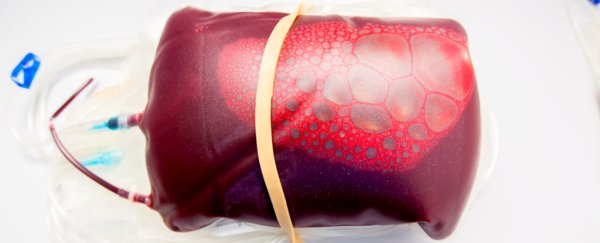Despite the hype, giving dementia patients the blood of young donors hasn't turned out to be the silver bullet in the heart of Alzheimer's - not yet, at any rate.
The small, controversial and much hailed human clinical trial that began in 2014 has concluded - and found that the rich, juicy blood of the young makes no changes to the cognitive state of dementia patients.
It sounds like something out a modern-day Elizabeth Báthory tale, or calls to mind the Mad Max "blood bags", but a series of experiments on mice had shown promise for the use of youthful blood as a treatment for dementia and other age-related ailments.
It all started with something called parabiosis, first described in 1864. The skin of two living mice is stitched together, joining their circulatory systems. When Clive McCay of Cornell University did this in the 1950s with older and younger mice, he found the older mouse's cartilage appearing younger than it should have.
More recently, researchers found that giving old mice new blood had a number of beneficial effects. For instance, it has been shown to replenish bone marrow stem cells.
A protein abundant in the blood of young mice called growth differentiation factor 11 (GDF11) has been found to restore skeletal muscle, reverse heart decline - and, importantly, restore cognitive function.
And a study earlier this year even found that human umbilical cord blood could restore cognitive function in elderly mice.
Back to the 2014 human trial. Stanford University neurologist Tony Wyss-Coray and his team tested 18 people between the ages of 54 and 86 who had mild to moderate Alzheimer's disease.
Each of these people received weekly transfusions for four weeks. The transfusions were either a placebo, or plasma - blood with the red cells removed - extracted from male donors aged between 18 and 30.
First of all, the treatment appeared to be safe. Only one of the patients demonstrated a possible adverse reaction - a rash, after which they dropped out of the study.
However, while the patients showed little or no adverse reactions, neither did any of them show any cognitive improvement, performing no better on tests administered by the researchers.
They all did show slight improvement in one area - performing day-to-day tasks. On a 30-point scale, they improved, on average, by 4.5 points on a caregiver survey about how much help they needed with tasks like cooking and travelling.
The team has been careful to point out the small scale of this first trial. The results haven't been published in a peer-reviewed journal yet, although the researchers are about to present the results at a conference. And the study has also attracted criticism.
"The scientific basis for the trial is simply not there," said neurologist Irina Conboy of the University of California, Berkeley, who has performed parabiosis experiments.
"The effects of young blood on cognition have not been replicated by an independent group, and there has never been a test with a mouse model of Alzheimer's."
And well before the results were announced, the field of research became problematic. Earlier this year, a startup was offering places on a so-called and heavily criticised "clinical trial" to be infused with young blood - if punters could pony up US$8,000 for the privilege.
Startup Alkahest, which was co-founded by Wyss-Coray and funded the trial, will be using this study as a starting point for more research. The next study will use plasma that contains the growth factors, but not coagulation factors or other components.
"This is a really very small trial and the results should not be over-interpreted," Wyss-Coray told Nature news.
The results of the study will be presented at the 10th Clinical Trials on Alzheimer's Disease meeting in Boston on 4 November.
